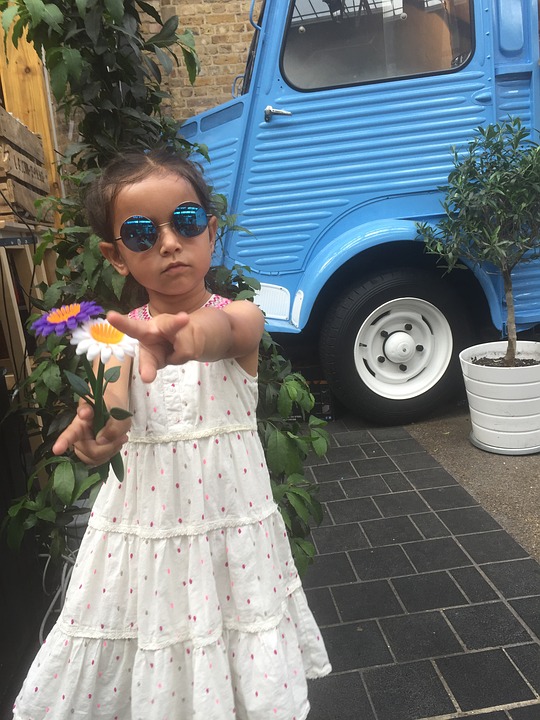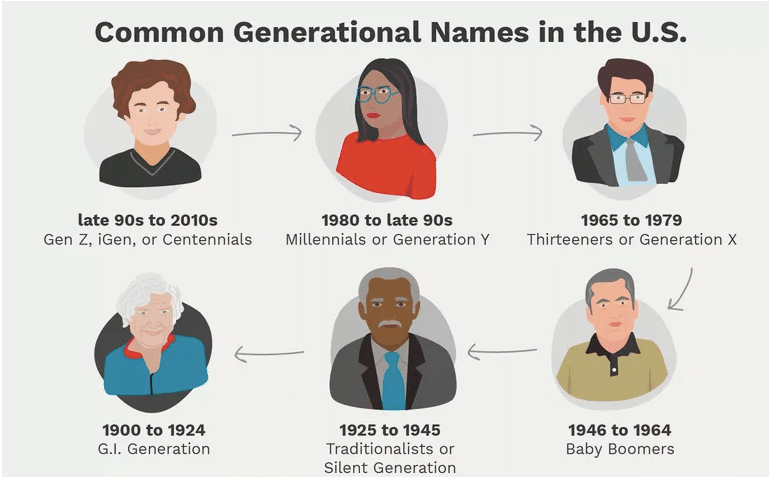OK, what generations are we talking about? We call a generation "all of the people born and living at about the same time, regarded collectively" or alternatively “a group of living beings constituting a single step in line of descent from an ancestor” – as Wikipedia puts it. Although these are two very different things, I’ve always wondered whether, through their parenting style, each generation of “parents” influences the traits of each generation of “children” individually and as a social group.
From the age of about 12-13, I was allowed to, and had to make, quite important decisions like whether to go to school or not - my mother is definitely a Free-Range parent. As a result, I graduated with distinction and became a responsible and potentially authoritative person – very much like my grandmother. Of course, my mother’s parenting was not just a strategy as her light-hearted natural way was derived in turn from her own mother being very protective. This distilled example has always made me wonder whether the generations, as a rule, cause the next one to become the polar opposite, thus maintaining a balance in human history?

20th century people in the West, and increasingly globally, are commonly divided into groups also known as cultural generations, as in the chart below by thoughtco.com
The first three generational groups seem to confirm the hypothesis: The “Greatest Generation” which faced major historical challenges, their children, the “silent” generation of the “lucky few” who lived in a relatively prosperous era and then the grandchildren of the Greatest Generation - the “Baby Boomers”: idealists, sexual revolutionaries and people responsible for moving authority and focus from the experience of the eldest to the energy of the youthful.
As if this was not complicated enough, the duration of the generations themselves decreases as “time speeds up” towards the next era. So, recent family generations and cultural generations don’t match even broadly. The children of Baby Boomers’ (and in part Traditionalists’) - Generation X also called “latchkey generation” - grew up with reduced adult supervision. Characterized as cynical and disaffected in the 90s, they are now, in their midlife, described as active, happy and balanced.

The next generation is maybe the most famous (infamous?) and surely very much discussed and analyzed. How to work with them? How to sell to them? What are their values and behavioral patterns? Mysterious Millennials – seem to be almost aliens. I have this perception too, and sincerely don’t know how to deal with the fact that according to the chart above I’m one of them. And, if you are a parent of a childcare age kid, there is a good chance that you are too. They are a popular topic so I won’t go into detail. Here is what Wikipedia has to say: in short, an elevated use of technology, introverts finally winning, ethical and ecological consciousness and individualism… But what is most striking about Millennials is that they are not the main characters of the current history scene anymore! Roll over, Sheldon Cooper – here comes Generation Z.
Trying to understand this generation of people, now entering adult life, was the main reason for this blog. IGens increasingly rely on, relate to and indeed create, the new social landscape – which now can’t be separate from rapidly changing world of social media, its power and reach and apparent ability to equalize opportunities and give everyone a voice. I recently read an article on Quora – see full text here – where the teacher answers what are the goals of her high school students:
"• One wanted a degree in restaurant management because he already worked at a restaurant and had contacts in the field. He was extremely bright and charismatic and honestly could have been successful in almost any field
• I’ve had a few students pursue early childhood education, again because they had experience and contacts.
• Quite a few students have been interested in real estate and investing.
Basically I haven’t had a single student with a dream or goal that wasn’t rooted in practicality, financial stability, or an area they feel they already have an “in” because of the people they know.”
This confirms the feeling I have when reading IGen’s Instagram profiles. Efficiency, planning, money, pursuing goals and “getting there” – to name some popular topics. There’s nothing wrong with that, apart from my personal subjective stupefaction. Seriously? 18 years old? Where is idealism, stupid romanticism, love and partying? Of course I’m not talking about everyone, but the impression is that the availability of information on one hand, and the virtual reality in which everyone shows their perfect self – results in young people feeling obliged to be as knowledgeable, pragmatic, hard working, successful, positive and wise as anyone they can possibly read about, even if they are in their first year of college. Who’s got time to mess around and have fun if everyone else apparently is perfect, driven to success and in most cases seems to be already there!

Hard working – this is another popular idea of IGen people (and millennials) - that is not traditionally associated with younger generations. How often we see words “I love my job” or mottos like “work hard play hard”. Widespread “loving to work a lot and being proud of it” was enabled by Social Media (and maybe Economic Crisis (2008) and unemployment). From being boring “adulting” stuff, hard (yet not physical) work became an essential part of being cool almost overnight from a historical societal viewpoint. Where has the good old “all work and no play” rebuke gone? Here is a very interesting article by the NYT that suggests that this way to see work is actually very convenient for employers who receive higher worker efficiency based on enthusiasm.

So, will the children of these practical, efficiency-360° driven people follow generational precedent and instinct to oppose and instead become carefree and idealistic, singing in the rain and putting flowers in their hair? Or, having been Instagram stars at the age of 6 months without knowing it, will they reconsider Privacy and Big Data use and switch from everything being Open to Public to the opposite? Or maybe using smartphones almost from day 1 and having all life events and emotions pre-categorized by hashtags, emoticons and memes will influence their minds so much that a completely new type of human will appear? Of course, one can generalize up to a point and no one person is entirely representative of their generation. But, working with the adult humans of tomorrow as child care teachers do, we can’t help but think about what world they will inhabit and try to equip each child with the tools to help them navigate through and thrive in their new world.

